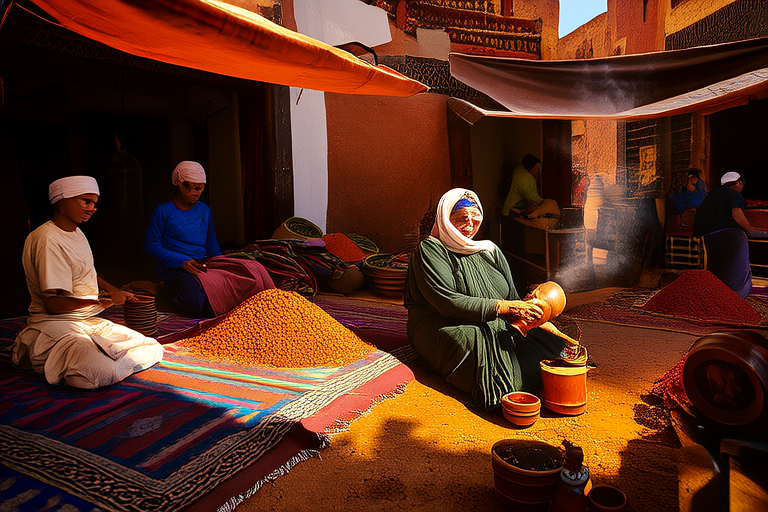Cultural Customs Uncovered: How Local Traditions Shape Our Lives

Cultural Customs Uncovered: How Local Traditions Shape Our Lives
Introduction
Cultural customs are the invisible threads that weave together the tapestry of human experience. They are the rituals, practices, and beliefs that define a community’s identity and provide a sense of continuity and belonging. Whether it’s the way we greet each other, the foods we eat, or the festivals we celebrate, these customs play a pivotal role in shaping our daily lives. For locals, they offer a deep connection to heritage and tradition, while for travelers, they provide a window into the rich diversity of global cultures.
In this article, we delve into the profound impact of cultural customs, examining how they influence identity, values, and behaviors, and how they shape our daily lives, societal norms, and personal experiences. By exploring specific examples from around the world, we aim to highlight the importance of understanding and respecting these traditions.
The Importance of Cultural Customs
Cultural customs are not merely relics of the past; they are living entities that shape the present and influence the future. They serve as a vital link between generations, ensuring that history and knowledge are passed down through time. Customs help individuals develop a strong sense of identity and belonging, fostering a shared understanding of what it means to be part of a particular community.
In many societies, traditions play a crucial role in preserving historical memory. For example, in Japan, the tea ceremony is not just a ritual but a practice that embodies centuries of philosophical thought. It teaches participants about mindfulness, respect, and harmony. Similarly, in India, the practice of Diwali, the festival of lights, symbolizes the triumph of good over evil and light over darkness. These customs not only celebrate the past but also instill values that guide present and future actions.
Across the globe, customs vary widely, yet they all share a common purpose: to bind people together and create a shared sense of purpose. Whether it’s the intricate beadwork of the Zulu people in South Africa or the elaborate masks worn during the Carnival of Venice, these traditions are expressions of identity and culture.
Daily Life Influences
Local traditions deeply influence daily routines, from the food we eat to the clothes we wear and the ways we celebrate. In many Middle Eastern countries, breakfast often includes flatbread and dates, reflecting both the region’s agricultural heritage and its Islamic traditions. In contrast, in Scandinavian countries, hearty stews and fish dishes dominate the menu, influenced by the cold climate and proximity to the sea.
Clothing choices are also shaped by cultural customs. In some African tribes, intricate patterns and vibrant colors in traditional attire signify status and identity. In Western societies, business attire reflects professional standards and expectations. Even something as simple as shaking hands or bowing can vary significantly from culture to culture, influencing how people interact socially.
Festivals and celebrations are perhaps the most visible manifestations of cultural customs. In Mexico, the Day of the Dead (Día de los Muertos) honors deceased loved ones with altars, parades, and offerings. In Brazil, Carnival is a raucous celebration of music, dance, and color. These events not only bring joy but also reinforce community bonds and shared values.
Societal Norms and Practices
Cultural customs extend beyond personal habits and into the realm of societal structures. They influence legal systems, educational methods, and even governance. For instance, in many indigenous communities, decision-making processes are collective and consensus-based, reflecting a belief in communal responsibility. This contrasts sharply with hierarchical systems found in some Western democracies.
Education systems also reflect cultural values. In Finland, schools emphasize collaboration and creativity, producing some of the highest-performing students globally. In contrast, in China, rote learning and standardized testing dominate, preparing students for a competitive job market.
Legal systems are another area where cultural customs play a significant role. In Islamic countries, Sharia law governs personal and family matters, while in secular states, laws are based on principles of justice and equality. Understanding these differences is crucial for both legal professionals and citizens navigating diverse legal landscapes.
Personal Experiences and Travel Insights
Travel provides a unique opportunity to experience cultural customs firsthand. Many travelers return home with stories of encountering unexpected traditions. One traveler recounted visiting a remote village in Peru where the locals welcomed him with a ceremonial drink made from coca leaves. This practice, rooted in Andean culture, symbolizes respect and hospitality.
Another traveler described attending a traditional wedding in Turkey, where guests were expected to participate in a lively dance known as the zeybek. Such experiences broaden perspectives and foster empathy, encouraging us to see the world through different lenses.
When traveling, it’s essential to approach unfamiliar customs with respect and curiosity. Embracing local traditions not only enhances the travel experience but also promotes cross-cultural understanding. By doing so, we can build bridges between communities and enrich our own lives.
Conclusion
In conclusion, cultural customs are integral to shaping our lives and enriching our experiences. From the smallest gestures to the grandest celebrations, these traditions provide a framework for understanding ourselves and others. They teach us about the past, guide us in the present, and inspire us for the future.
As we continue to navigate an increasingly interconnected world, it is more important than ever to appreciate and respect the diversity of cultural customs. Let us embrace these traditions, not as barriers to understanding, but as gateways to deeper connections and shared humanity.